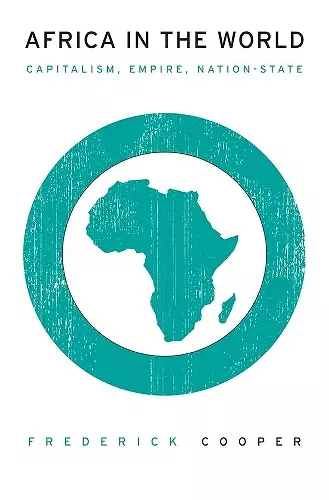Africa in the World
Capitalism, Empire, Nation-State
Format:Hardback
Publisher:Harvard University Press
Published:24th Mar '14
Currently unavailable, and unfortunately no date known when it will be back

At the Second World War’s end, it was clear that business as usual in colonized Africa would not resume. W. E. B. Du Bois’s The World and Africa, published in 1946, recognized the depth of the crisis that the war had brought to Europe, and hence to Europe’s domination over much of the globe. Du Bois believed that Africa’s past provided lessons for its future, for international statecraft, and for humanity’s mastery of social relations and commerce. Frederick Cooper revisits a history in which Africans were both empire-builders and the objects of colonization, and participants in the events that gave rise to global capitalism.
Of the many pathways out of empire that African leaders envisioned in the 1940s and 1950s, Cooper asks why they ultimately followed the one that led to the nation-state, a political form whose limitations and dangers were recognized by influential Africans at the time. Cooper takes account of the central fact of Africa’s situation—extreme inequality between Africa and the western world, and extreme inequality within African societies—and considers the implications of this past trajectory for the future. Reflecting on the vast body of research on Africa since Du Bois’s time, Cooper corrects outdated perceptions of a continent often relegated to the margins of world history and integrates its experience into the mainstream of global affairs.
In a gem of a book you can read either as world history or African history, you see a historian’s craft at its best: Cooper foregrounds the history of the continent to show how Africa has been entwined with global processes for centuries as he revisits old concerns with new insights, reminding us that contexts may shift but a scholar’s passionate regard for place and people does not. -- Luise White, author of Speaking with Vampires: Rumor and History in Colonial Africa
Cooper’s focus on a deep understanding of the ‘pathways’ and ‘junctures’ by which history is made, at the time, is brought here to one of the largest questions in twentieth-century African history: how did the nation-state triumph as the political form for post-colonial life? He applies his range of historical skills, and his lifetime of erudition in the study of empires, to suggest answers which promise to provoke discussion, research, and interest among scholars and citizens for a long time to come. -- Jane I. Guyer, Johns Hopkins University
In this brilliant and compelling book, Cooper reflects on both the possibilities and the constraints presented by Africa’s uneven insertion into global capitalism and imperial systems, demonstrating that the troubled nation-state was not the inevitable outcome of decolonization. Informed by a scholarship remarkable for both its breadth and depth, Africa in the World will be obligatory reading for specialists and non-specialists alike. -- Megan Vaughan, author of Creating the Creole Island: Slavery in Eighteenth-Century Mauritius
- Nominated for African Studies Association (ASA) Best Book Prize (formerly known as the Melville J. Herskovits Prize) 2015
- Nominated for Martin A. Klein Prize in African History 2015
ISBN: 9780674281394
Dimensions: unknown
Weight: unknown
144 pages